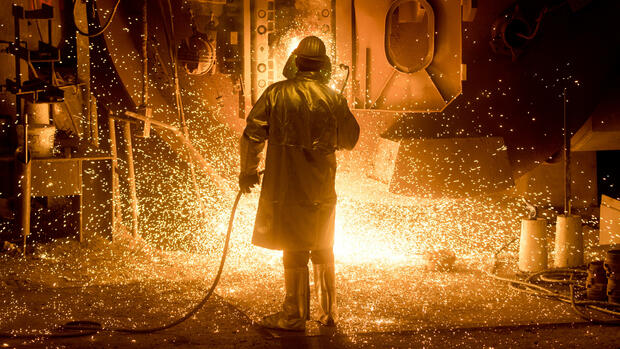Energy-intensive companies have so far been able to recoup a large part of the energy taxes.
(Photo: dpa)
Berlin The coalition surprisingly cancels the peak equalization in the energy and electricity tax for industry. The item of 1.7 billion euros is not included in the draft budget for 2024, which the federal cabinet approved on Wednesday.
The resentment in the affected sectors is great. Companies from energy-intensive sectors benefit from peak balancing. You get up to 90 percent of the energy and electricity tax reimbursed.
The Federation of German Industries (BDI) sharply criticized the decision: “The abolition of peak compensation means a tenfold increase in the electricity tax burden for almost 9,000 companies. Such a tax increase at a time when many industrial companies in Germany are under existential pressure is extremely problematic and jeopardizes the preservation of our value chains,” said BDI President Siegfried Russwurm. Especially in the current crisis, Germany must be strengthened as an industrial location instead of burdening companies.
Criticism also came from the German Chamber of Industry and Commerce (DIHK): The end of the peak equalization increases the already great uncertainty in Germany’s energy-intensive industry enormously, said DIHK President Peter Adrian. “Combined with the discussion about an immature industrial electricity concept, a dangerous mixture is created,” said Adrian. This causes considerable damage – far beyond the energy-intensive companies. The pressure on the industry to migrate is constantly increasing.
Business representatives report that Finance Minister Christian Lindner (FDP) already let them know on Tuesday that he is not planning to apply to the EU Commission for an extension of the state aid approval for the top tax equalization for 2024. Lindner (FDP) defended the decision. It will be “implemented a wish that has long been expressed by the Greens,” he said on Wednesday.
>> Read also: Economic experts speak out against industrial electricity prices
However, coalition circles said the deletion was not an initiative of the Greens. In fact, Economics Minister Robert Habeck (Greens) had already warned at the end of last week that Lindner was planning to cancel the compensation.
The top tax equalization has long been controversial. His critics consider it an environmentally harmful subsidy. Proponents argue that it helps companies survive in the face of high energy costs.
More: Chemical industry should avoid CO2 with recycling
